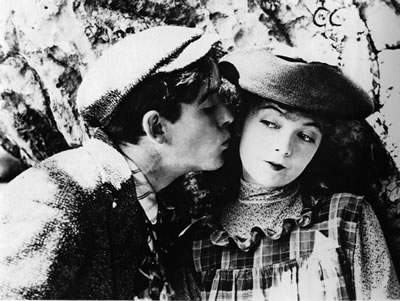
Robert
Harron, Lillian Gish
TRUE HEART SUSIE (Amore
sulle labbra) (D.W. Griffith; Griffith’s
Short Story Series, US 1919)
Regia/dir: D.W. Griffith; cast: Lillian Gish, Robert
Harron, Clarine Seymour; 35mm, 1682 m., 91’ (16 fps), Danish Film
Institute.
Didascalie in inglese / English intertitles.
Scheda completa nel catalogo delle
Giornate 2006 (pdf, 4,2 Mb). / For a complete
programme note, download the Giornate 2006 catalogue (pdf,
4,2 Mb).
Accompagnamento musicale composto e condotto da / Live musical accompaniment,
composed and conducted by Giovanni Spinelli, eseguito da/performed
by Andrea
Bellato (violoncello), Gabriele Bellu (violino/violin), Fabrizio Merlini
(viola). Prodotto da/produced by Paolo Cherchi Usai per/for Le Giornate
del Cinema Muto.
Tra i lavori meno noti di Griffith, True Heart Susie è considerato
da alcuni il suo vero capolavoro, un film che presenta moltissimi stimoli
e sfide per il compositore ed il musicista. Dopo averlo esaminato con Paolo
Cherchi Usai delle Giornate, ho capito presto che non avrei dovuto cercare
di ridurre Susie ad un tema musicale solitario e prevaricatore: l’opera è,
credo, troppo complessa per permettere un solo filo conduttore musicale.
A partire dalla protagonista stessa: il ritratto che Lillian Gish dà di Susie presenta
un tessuto di emozioni quasi illimitato, che – io
penso – ispirerebbe qualunque compositore ed anche molti dei migliori
attori di oggi. Ci sono pertanto diversi temi ricorrenti nella musica:
l’amore di Susie per William, contrapposto alla riluttanza ed all’incertezza
di lui; la lotta di Susie per convincere William, e il dolore che prova
quando lui si fa traviare dalla sua rivale, Bettina; il cuore sostanzialmente “sincero” di
Susie, la sua compassione ed il suo amore, che alla fine trionfano.
Scrivendo la musica ho cercato di rendere il contrasto, presente in Griffith,
tra la tradizionale vita pastorale dei personaggi principali e la modernità,
che avanza a passi veloci, della vita urbana con cui si confrontano. La
musica è orchestrata per un terzetto d’archi più il
pianoforte, intrecciata con diverse composizioni moderne, dall’ambient
all’industriale all’elettronica e, a volte, la techno. Questo
contrasto tra “classico” e “moderno” è un
tentativo di rendere giustizia al senso di eterno che Susie – giustamente – si
merita. – GIOVANNI SPINELLI
One of Griffith’s lesser-known works, True Heart Susie is
considered by some to be his true masterpiece. The film presents a variety
of stimuli
and challenges for the composer and musician. After reviewing it with Paolo
Cherchi Usai of the Giornate, I soon realized that I should not attempt
to reduce Susie to a solitary, over-arching musical theme. The
work is, I believe, too complex to allow for a single common musical thread.
Starting from the protagonist herself: Lillian Gish’s portrayal of
Susie presents an almost boundless canvas of emotions, which I think would
inspire any composer, and indeed many of the best actors today.
There are
therefore several recurring themes in the score: Susie’s love for
William, which is juxtaposed with William’s reticence and uncertainty;
Susie’s struggle to win William over, and the pain she experiences
when he is led astray by her rival, Bettina; Susie’s fundamentally “true” heart,
compassion, and love, which eventually conquer all.
In writing the score I have tried to render Griffith’s contrast between
the pastoral, traditional life led by the main characters with the fast-paced
modernity of the urban life with which they are confronted. The music is
scored for a string trio and piano, interwoven with various modern textures,
ranging from ambient to industrial to electronica, and, at times, techno.
This contrast between “classical” and “modern” is
an attempt to do justice to the timelessness that Susie truly deserves. – GIOVANNI
SPINELLI
GIOVANNI SPINELLI, compositore nato in Inghilterra di origini fiorentine,
ha vissuto a Londra, New York, Stoccolma e Firenze. La sua ricerca è stata
influenzata in parte da autori moderni quali Ärvo Pärt, Phillip
Glass, Steve Reich, Michael Nyman, Henryk Górecki, Ryuichi Sakamoto
e John Adams, oltre che dai grandi classici. Spinelli - che attualmente
vive e lavora a New York - è autore di varie colonne sonore per
film e documentari. Ha scritto inoltre musiche per teatro, musica elettronica
e sperimentale.
Tra le sue collaborazioni recenti: Private Life of the Master Race (di
Bertolt Brecht, diretto da James Phillips Gates); Teatro Slovak (scritto
e diretto da Richard Caliban); Cadillac Man (documentario - Hellskitchenfilms);
Maree (film scritto e diretto da James Pellerito, Menzione Speciale al
Festival di Berlino, Edizione 2004). La sua opera per pianoforte ed archi,
Quattro movimenti per pianoforte ed orchestra è stata eseguita dal
GAMS Ensemble a Firenze nel dicembre, 2003. Il suo quartetto per
archi, Musiche per quattro strumenti ad arco - Jasna Gòra, è stato
eseguito dal Quartetto Elisa a Parma nel luglio, 2005. (Per ulteriori
informazioni cfr: www.innavoig.com)
Composer GIOVANNI SPINELLI was born in England, and has lived in
London, New York, Stockholm, and Florence. Currently living and working
in New
York, Spinelli's work has been influenced in part by such modern composers
as Ärvo Pärt, Phillip Glass, Steve Reich, Michael Nyman, Henryk
Górecki, Ryuichi Sakamoto, and John Adams, as well as by the great
classics. He has composed a number of scores for films and documentaries.
He has also written for the theatre and electronic and experimental music.
Recent works include music for Private Life of the Master Race (by
Bertolt Brecht, directed by James Phillips Gates); Teatro Slovak (written
and directed
by Richard Caliban); Cadillac Man (documentary - Hellskitchenfilms);
and Maree (a film by James Pellerito; Special Mention at the 2004
Berlin Film
Festival). His work for piano and strings, Quattro movimenti per pianoforte
ed archi [Four Movements for Piano and Strings], was premiered by the
GAMS Ensemble in Florence in December 2003. His string quartet, Musiche
per
quattro strumenti ad arco - Jasna Gòra [Music for Four String Instruments
- Jasna Gòra], was premiered by the Elisa Quartet in Parma, Italy,
in July 2005. (For more information please visit: www.innavoig.com)